第五讲 商务英语翻译的被动语态的翻译
实用商务英语翻译教程—— 被动语态的处理

外教一对一实用商务英语翻译教程——被动语态的处理被动语态的处理商务英语中被动语态使用范围很广,凡是在不必说出主动者、不愿说出主动者、无从说出主动者或者是为了便于连贯上下文等情形下,往往都用被动语态。
汉语中虽然也有被动语态,但是使用范围狭窄得多。
商务英语中被动语态的句子,译成汉语时,很多情况下都可译成主动句,但也有一些可以保留被动语态。
一、保留被动语态在进行英译汉时,语态不变,仍然保持原来的被动语态,但译者常常需要在主谓语之间加上一些汉语中表示被动的介词,如“被”、“给”、“遭”、“为……所”等。
译例l◆Competition in business is regarded to be a means to earn money.译文商业竞争被认为是一种挣钱手段。
译例2> Although Americans today are likely to think that Alger's stories are too good to be true, they continue to be inspired by the idea of earning wealth and success as an entrepreneur who makes it on his own.译文尽管今天美国人有可能认为阿尔杰的故事好得令人难以置信,但是他们却依然为那种自力更生赢得财富和成功的企业家精神所鼓舞。
句中的“they continue to be inspired by the idea of earning wealth a nd success as an entrepreneur who makes it on his own”采用的是被动语态,在翻译成汉语时,可以保持原来的语态,只是在主谓语之间加上汉语中表示被动的介词:“为……所”就可以了。
二、转换成主动语态在有些情况下,可变换语态,将原来的被动语态转换成主动语态,使译文明确易懂。
商务英语语篇中被动语态的运用及其翻译
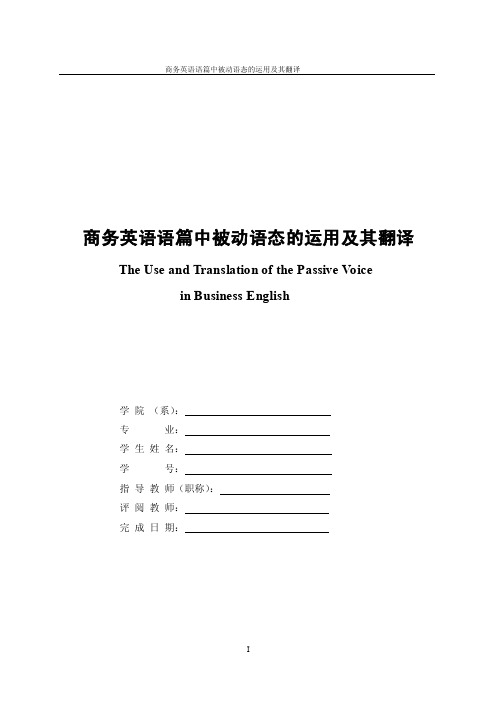
商务英语语篇中被动语态的运用及其翻译The Use and Translation of the Passive Voicein Business English学院(系):专业:学生姓名:学号:指导教师(职称):评阅教师:完成日期:I商务英语语篇中被动语态的运用及其翻译[摘要]被动语态是语言学中较为常见的语法现象。
较汉语而言,英文中使用得更为广泛,尤其是在商务英语这一实用性语体中更是有着举足轻重的地位。
本文共分四章对此课题进行研究,首先对英汉语篇中被动语态做对比分析;接着进一步探究了商务英语中被动语态的分类、功能及运用,商务英语中被动语态的大量使用实现了正式、公正、礼貌、委婉等语用功能,是合作原则与礼貌原则的体现;然后具体介绍了商务英语中被动语态的翻译,由于汉语中较少使用被动语态,因此翻译上应注重功能对等,在措辞上遵循汉语表达的同等语用功能;最后做出总结。
[关键词]商务英语;被动语态;运用;翻译IIThe Use and Translation of the Passive Voicein Business EnglishEnglish MajorAbstract: The passive voice is a common grammatical phenomenon in linguistics. Compared with the Chinese, it is used more widely in English, and it also has a pivotal position in the practical Business English language. This paper is divided into four chapters to discuss this subject. At first,we do comparative analysis of the passive voice in Chinese and English; And then further explore the classification, function and use of passive voice in English. The extensive use of passive voice has achieved formal, impartial, courteous, tactful and other pragmatic functions, which also shows the principle of cooperation and courtesy; then it specifically introduces the translation of passive voice in English. Because the passive voice is less used in Chinese, we should focus on the functional equivalence of translation that is, trying to make the Chinese wording have the same pragmatic function; At last we have a summary.Key words: Business English; passive voice; use; translation strategiesIIIContentsIntroduction (V)Chapter 1 The Comparison of Passive V oice in English and Chinese (2)1.1 The forms of passive voice (2)1.1.1 The form of passive voice in English (2)1.1.2 The form of passive voice in Chinese (2)1.2 The features of passive voice (3)1.2.1 Format (3)1.2.2 The relationship of subject and object (5)1.2.3 The mobility (5)1.3 The factors of using passive voice (5)Chapter 2 Passive V oice in Business English (6)2.1 Classification (6)2.2 Pragmatic function (6)Chapter 3 The Translation Strategies of the Passive Voice in B usiness English (9)3.1 Using passive forms (10)3.2 Using active forms (10)Conclusion (12)References (14)Acknowledgements (XIX)IVIntroductionInternational business activities are increasing in today‟s economic globalization. The English used in the introduction of technology, foreign trade, investment, foreign contracting and labor service contracts, international finance, foreign insurance, overseas investment and other fields are all called Business English. Business communication is the bridge for people to explain views and achieve cooperation, which is inseparable from the speech activities. English as a universal language in the world plays an important role in business verbal communication. Business English is a branch of the English language system, which serves for the specific international business activities. It is based on English vocabulary, basic grammar and sentence structure, but it has a unique language phenomenon and content. From the stylistic features of Business English, we can easily find there are lots of passive sentences, which are not commonly used in Chinese, so we have encountered problems in the translation. It is necessary for us to have a comparison of the differences between English and Chinese. Exploring the use of passive voice in business English discourse and its translation is good for a translator to grasp the original style, make a rational wording and protect the speakers‟interests as well as manifest their courtesy and cooperation.VChapter 1 The Comparison of Passive V oice in English and Chinese1.1 The forms of passive voicePassive voice is a common grammatical phenomenon in English which is opposed to the active voice. It composed of different tense of “to be” followed by a verb‟s past participle form and the subject is the bearer of the action. Passive voice can avoid giving others the subjective feeling, so that the text is more objective and formal and the tone will be more tactful. “English passive voice has a variety of forms, and there are strict rules for the structure and syntax. While in Chinese only one word or phrase in the passive form can show the passive voice.”(何自然,1988:42) [1]1.1.1 The form of passive voice in EnglishA. The passive voiceThe passive voice is the most common form to manifest the English passive meaning, in general, it is composed of “be + past participle”or “get / become + past participle”.The passive voice composed of “g et / become + past participle” generally refers to the result of the action rather than the action itself.It often expresses the meaning that something is finally done, something takes place suddenly or someone has a chance encounter. It can also show the “gra dation” of the state, emphasis on action process. For example:[e.g. 1] History is made by the people.The more I hear, the more I get / become troubled.B. The active form expressing the passive meaningThere are some verbs with active form in English which actually are expression of passive meaning. For example,[e.g. 2] The man is drowning = The man is being drowned.1.1.2 The form of passive voice in ChineseUnlike English passive sentence,the Chinese passive sentence doesn‟t change the form. The difference between passive sentence and active sentence lies in the “mark words of the form”. If you don‟t take the semantic level into account, there is no different sign between the form of passive sentences and the general structure of the active sentences. Therefore, the Chinese passive sentence can be also divided into two categories: passive sentence with theVInegative mark and the active form expressing passive meaning. This presentation will help us to compare it in English and Chinese. Chinese passive sentence is verb-predicate sentence and its adverbial is preposition phrase composed of “被”. The subject is the bearer of the verb, and the object is the executer. For example, “敌人被我们消灭了。
商务英语翻译8.2 被动语态的翻译

5. 译成汉语判断句
有些英语被动句并不突出强调被动动作,而着重对 事物的状态、过程和性质等加以描述,其作用与系 表结构类似。因此,翻译这种英语被动句,经常采 用“是……的”判断句式。
1. Our price has already been closely calculated. 我方价格是经过精密核算的。
6. 常用被动句型的习惯译法
在英语常用被动句型“It+被动语态+that”中,it 是形式主语,that引导出的是主语从句。 汉语译文习惯上采用主动语态,有时还需要增译 出泛指性的主语,有时也可译成无主句并酌情加 上“根据”或“据”。
6. 常用被动句型的习惯译法
1. It must be pointed out that only if quality is improved can more outlets for export be found and expects be increased. 必须指出的是,质量好了,才能打开出口渠道并扩 大出口。 2. It is generally agreed that organizations that with effective manages will likely be successful, whereas organizations with poor managers will likely fail. 人们普遍认为,拥有高效胜任的管理人员,公司成 功的可能性更大,而管理人员能力低下的公司则大 多会失败。
4.增加主语
有些英语被动句并未在句中出现表示行为主体的 词或词组,在翻译这类句子时,可适当增添一些 不确定的主语,如,“人们”、“有人”、“大 家”、“我们”等。
被动语态的翻译 PPT课件
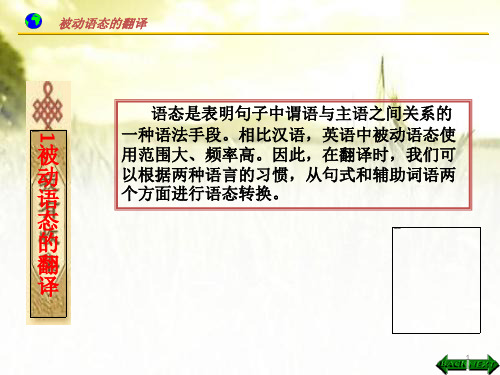
运动定律将在下文中予以讨论。
使用“加以”、“予以”字 样 表达被动含义。
9) The details of the facade will be further fitted up to match the interior. 铺面将进一步加以装修,使之与室内装饰浑然一体。
8
被动语态的翻译
1.2 译成主动句
7). In his late thirties he was almost knocked down in his despondency of the unsuccessful career. 近四十岁时,由于事业上的挫折,他几乎为失意所 毁。
7
被动语态的翻译
[<]
8) The laws of motion will be discussed in the next articles.
3) All around, the hill were black with oil, and some were
hidden by gas and drifting oil spray. 四周,由于蒙上了一层油,山峦是黑色的,有的山 峦则被天然气和在风中飘洒的喷油遮挡住了。 4) The thrust force of an airplane is produced by the propeller. 飞机的推力由螺旋桨所产生。
在译成汉语时,除了用 “被”表示外,还可以运用
其他词语,如 “受”、“遭”、“让”、“给”、
“ 叫”、 “ 由”、 “ 把”、“挨”
“ 为 …… 所”、
“加以”、“予以”等。例如:
2
被动语态的翻译
1) The optimists believe defeat is not their fault: circumstances, bad luck, or other people brought it about. Such people are not bothered by defeat. 乐观主义者相信失败并不是他们的错,环境、运气不佳 或其他人都可能造成自己的失败。这些人从不为失败所 困扰。 2) When optimists run for office, they are more apt to be elected than pessimists are. 当乐观主义者参加竞选时,他们比悲观主义者更容易 当选。
第五讲 商务英语翻译的被动语态的翻译
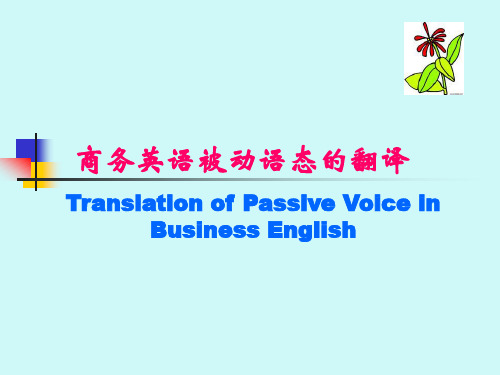
3. “予以/加以”等结构 (41)Problem of overstaffing should be resolved in good time. (42) Trade deficit can be controlled if proper measurements are taken.
4. “用/拿/靠……”等结构 (43) In our day, fish are caught in the sea and brought to us by rail and lorry. (44) Boats are moved by oars or by wind, and ships by paddle-wheels or screws.
7. 译成带表语的主动句 (“受事者—是—施事者—动词的”)
(25)The decision of acquisition and merger is not taken lightly by the management. (26) Negotiating an end to the trade war was first formally raised at the ministerial conference on June 22, 1995.
Ⅰ. Lead-in 导入
Translate the following sentences (1) We are kept strong and healthy by clean air. (2) Where can you be reached? (3) When will I be interviewed? (4) 人不可貌相,海水不可斗量
(See TB P98 for reference)
商务英语翻译8.2 被动语态的翻译[精]
![商务英语翻译8.2 被动语态的翻译[精]](https://img.taocdn.com/s3/m/a1e43f8a5ef7ba0d4a733bd8.png)
2. Two days are given to her for repairing this car. 给了她两天时间来修这辆车。 3. She ate less and less in the evening so that her weight may be decreased. 她晚上吃的越来越少,为的是减肥。
2. It is generally agreed that organizations that with effective manages will likely be successful, whereas organizations with poor managers will likely fail. 人们普遍认为,拥有高效胜任的管理人员,公司成 功的可能性更大,而管理人员能力低下的公司则大 多会失败。
第八章被动语态的翻译动语态的翻译汉语和英语的一个重要区别是汉语被动语态的使 用频率远远低于英语。因此,在英汉翻译中如何 处理被动语态显得极为重要。有些英语被动句着 重被动的动作,翻译时为了突出被动意义,可以 译成汉语表示被动的“被”字结构或相似结构, 如,“受、遭、叫、让、给、由、把、得到、受 到、加以、得以、为……所、由……来”等。
3. It may be said without fear of exaggeration that the newly-devised microcomputer can act as a guide to a blind person.
可以毫不夸张地说这种新设计的微型计算 机能够充任盲人的向导。
英语商务信函中被动语态的语用意义及其翻译
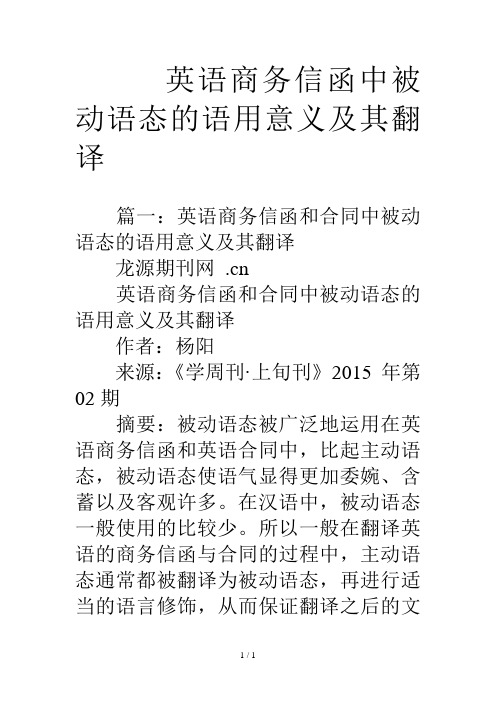
英语商务信函中被动语态的语用意义及其翻译篇一:英语商务信函和合同中被动语态的语用意义及其翻译龙源期刊网.cn英语商务信函和合同中被动语态的语用意义及其翻译作者:杨阳来源:《学周刊·上旬刊》2015年第02期摘要:被动语态被广泛地运用在英语商务信函和英语合同中,比起主动语态,被动语态使语气显得更加委婉、含蓄以及客观许多。
在汉语中,被动语态一般使用的比较少。
所以一般在翻译英语的商务信函与合同的过程中,主动语态通常都被翻译为被动语态,再进行适当的语言修饰,从而保证翻译之后的文章流畅通顺。
关键词:英语商务信函被动语态作为商务英语中比较常见的一种语法现象,有助于体现合作的礼貌与原则。
而商务英语中,被动语态的使用和汉语的被动语态的用法有着一定程度上的不同。
本文主要就针对商务英语中被动语态使用较多的商务信函与合同进行分析,从而更好地理解被动语态在商务英语中的应用与翻译状况。
一、对被动语态的认识被动语态作为动词的一种形式存在,主要是指主语是谓语动作的承受者。
若是要讲述一个客观事实就需要借助被动语态。
被动语态强调的是动作的承受者,而不是动作的发出者。
被动语态通常都是由by引导出来的,但是也有由介词by引导出来的短语,如“by bike”(骑自行车)“by bus”(坐公共汽车)等。
并且还有一些真被动、假主动的十几个常用词的用法都需要我们注意,如“so heavy to carry”表示的就是被动语态,但却不是用的“so heavy to be carried”。
针对被动语态使用的不同情况,我们一定要做到全面掌握每一种被动语态,这对于学习英语及商务信函和合同的翻译都是十分重要的。
二、英语商务信函和合同中被动语态的语用意义及其翻译(一)英语商务信函中被动语态的语用意义及其翻译被动语态作为一种重要的语言手段与工具被广泛运用在商务英语中。
与主动语态相比,被动语态不强调动作的发出者,这样在语气上就会显得委婉许多,也不会让动作的承受者感受到一种发出者将某种意思强加的强硬感觉。
商务英语中的被动语态及其翻译策略

商务英语中的被动语态及其翻译策略作者:印丽萍来源:《消费导刊》2009年第23期[摘要]被动语态在商务英语中被广泛使用,而在汉语中却用得很少,所以将商务英语中的被动语态翻译成汉语时就遇到了问题。
本文从商务英语的语言特点及被动语态的作用谈起,分析其翻译对策。
[关键词]商务英语被动语态翻译策略作者简介:印丽萍(1981-),女 ,汉,无锡市广播电视大学外语系,助教。
籍贯:江苏省镇江市丹徒区。
主要研究方向:英语教学。
一、引言语言在一定程度上和文化是密不可分的,因此,不同国家之间的语言具有不同的特点。
汉语和英语这两种语言比较起来,汉语是一种讲究意和的语言,而英语则重视形和,即通过语言结构、形式来实现各种不同意思的表达,所以英语中使用被动语态的频率较高,但在汉语中用得很少,且常会用主动形式去表达被动意思。
商务英语作为一种信息型文体,出于它对于语用功能的要求,更需要采用被动语态这种语言手段。
那么,在实际的学习和教学过程中,如何对这种特殊的语言现象进行理解和翻译呢?本文将从商务英语的语言特点及被动语态的作用入手,结合一般的翻译理论,谈一谈商务英语被动语态的翻译策略问题。
二、商务英语的语言特点商务用语较多采用术语是其主要特点之一。
因此,人们有时往往对一个很简单的词汇都会出现理解误区。
例如:accept.原本大家都知道它是表示接受的意思,但在商務英语中却可以用做“承兑”。
这种情况还有很多,再如:line. 我们都知道是表示“线,排成一行等”的意思,但在商务英语中,它还可以表示商品的种类,某一类行业。
用语简洁明了。
在商务英语中一些可以简单表述的内容绝对不会用冗长的用语去表达,例如:表示原因的词组due to the fact that就没有 because来得简单明了。
用语礼貌、委婉,常用被动语态。
例如:We are too heavily committed to be able to entertain fresh orders。
商务英语被动语态翻译PPT学习教案
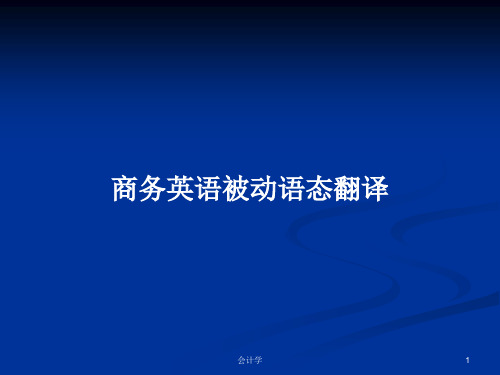
第7页/共35页
Ex.
1. An MBA degree is considered to be one of the important requirements for the corporate position.
人们认为工商管理硕士学历是担任这一公司职位的必要 条件之一。
2. With the development of modern electrical engineering, power can be transmitted to wherever it is needed.
随着现代电气工程的发展,人们能把电力输送uitcase.
Ex.
Trade relationship has been established between China and most other countries in the world.
中国与世界上大多数国家建立了贸易关系。
第10页/共35页
第20页/共35页
2. 译成汉语的被动式:其结构是“受事者-动词”。汉 语中表达被动的一些词或结构:遭受﹑遭到﹑受到﹑得 到﹑受﹑挨﹑叫﹑被…… ﹑给…… ﹑为……所等等。
Political contests remind us that the candidates are marketed as well as soap; students recruitment by colleges reminds us that higher education is marketed; and fund raising reminds us that “causes” are marketed. 政治竞争让我们看到候选人也像肥皂一样被宣传推销;大 学录取学生使我们明白高等教育也要宣传推销;集资活动 也让我们了解到“各种事业”同样也需要宣传推销。
《被动语态的翻译》课件

详细描述
被动语态的定义是指主语是动作的接受者,而不是动 作的执行者。在英语中,被动语态通常以“be”动词 加上过去分词的形式出现,例如“The book was written by the author”。被动语态强调动作和结果 的客观性,使得句子更加简洁明了,同时避免了主观 色彩,使得描述更加客观公正。此外,被动语态还可 以强调动作本身,突出动作的执行者和动作的结果。
被动语态的定义与分类
详细介绍了被动语态的定义、分类以 及在英语和汉语中的表现形式。
语境与文化因素
强调了翻译时需考虑的语境和文化因 素,以及如何处理文化差异。
翻译技巧
总结了被动语态翻译的常用技巧,如 直译、意译、归化与异化等。
常见问题与解决方法
语义偏差
列举了因不理解被动语态 含义而导致的语义偏差, 并给出了相应的解决方法 。
过去分词”等等。
被动语态的分类
要点一
总结词
被动语态可以分为三类,即现在简单时态被动语态、过去 简单时态被动语态和完成时态被动语态。
要点二
详细描述
被动语态可以分为三类,即现在简单时态被动语态、过去 简单时态被动语态和完成时态被动语态。现在简单时态被 动语态表示现在正在进行的动作或存在的状态,例如 “The book is being written by the author”。过去简 单时态被动语态表示过去正在进行的动作或存在的状态, 例如“The book was written by the author”。完成时 态被动语态表示已经完成的动作或存在的状态,例如 “The book has been read by many people”。
05
被动语态翻译的练习与解析
Chapter
商务英语被动句的翻译
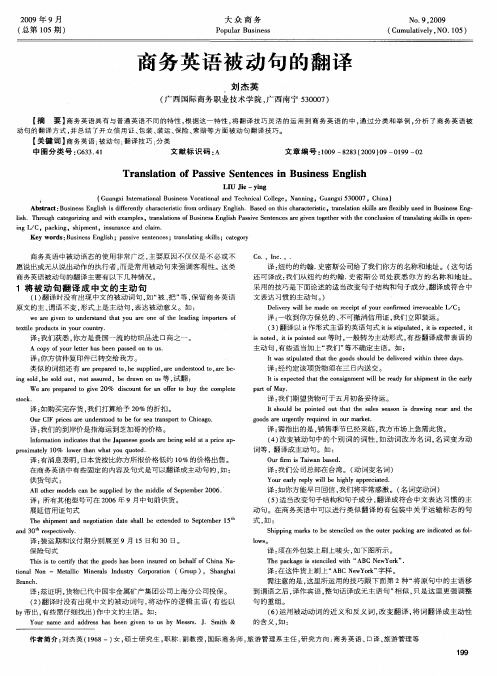
De ie l b d n r c i t o o rc n r e re o a l /C; l r wi e ma e o e ep fy u o fm d ir v c b e L vy l i
译: 装运 期和议付 期分别展 至 9月 1 5日和 3 O目。 保 险 旬 式
T i st e iy t a h o dsh s b e n u e n b h l o i a Na h si o c r f h t e g o a e n i s r d o e a f f Ch n — t t
【 摘 要 】 商务英语具有与普通英语不同的特性 , 根据这~特性, 将翻译技巧灵活的运用到商务英语的中, 通过分类和举例, 分析了商务英语被
动句 的翻译方式 , 总结 了开立信用证 、 装 、 并 包 装运 、 险 、 赔 等 方 面 被 动 句 翻 译 技 巧 。 保 索
【 关键词 】 商务英语; 被动句; 翻译技巧; 分类
译: 需指 出的是 , 售季节 已经 来临 , 销 我方 市场上急需 此货。 () 4 改变被动 句中 的个别 词 的词 性 , 动 词 改为 名词 , 如 名词 变 为动
词等 ,翻译成 主动句 。如 :
0u r sTa wa a e . rf i m i i n b sd
20 0 9年 9月 ( 第 15期 ) 总 0
大 众 商 务
Po ulr Busn s p a ie s
No 9, 0 9 . 20
商务英语翻译8.2 被动语态的翻译[精]
![商务英语翻译8.2 被动语态的翻译[精]](https://img.taocdn.com/s3/m/a1e43f8a5ef7ba0d4a733bd8.png)
2. Two days are given to her for repairing this car. 给了她两天时间来修这辆车。 3. She ate less and less in the evening so that her weight may be decreased. 她晚上吃的越来越少,为的是减肥。
5. The shipping quality and weight shall be regarded as final and binding upon both parties.
翻译练习
二、把下列句子译成英语。
1. 货币可用来交换商品或服务。 2.我们希望我们之间能做成许多生意。 3. 我们向您保证,此订单我们会慎重处理。 4. 客户给他写的信,大多数是由秘书念给他听。 5.贵方的销量在最近几个月中大幅度下降,我们对
1. Our price has already been closely calculated. 我方价格是经过精密核算的。
5. 译成汉语判断句
2. The plan for the next five years is made by the managers.
常用被动句型的习惯译法
在英语常用被动句型“It+被动语态+that”中,it是 形式主语,that引导出的是主语从句。 汉语译文习惯上采用主动语态,有时还需要增译 出泛指性的主语,有时也可译成无主句并酌情加 上“根据”或“据”。
6. 常用被动句型的习惯译法
1. It must be pointed out that only if quality is improved can more outlets for export be found and expects be increased. 必须指出的是,质量好了,才能打开出口渠道并扩 大出口。
商务英语翻译8.2 被动语态翻译-文档资料
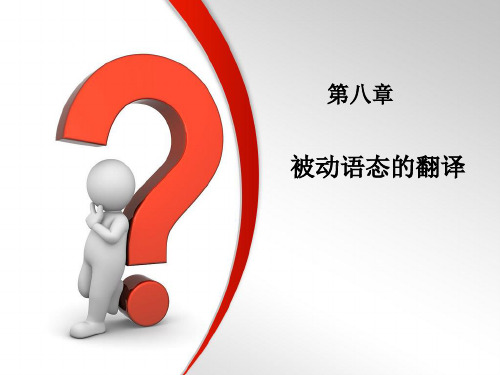
5. 译成汉语判断句
有些英语被动句并不突出强调被动动作,而着重对 事物的状态、过程和性质等加以描述,其作用与系 表结构类似。因此,翻译这种英语被动句,经常采 用“是……的”判断句式。
1. Our price has already been closely calculated. 我方价格是经过精密核算的。
2. 保留原主语, 译成主动句
1.The first partial goods will be shipped on the first available steamer at the beginning of June. 第一批货物将于6月初装在第一艘订到的船上。 2. An agreement was never reached for the simple reason that neither side wants to give in. 协议没有达成的原因很简单,那就是双方都不 让步。
1.This conclusion is hardly justified by the results. 这些结果很难证明这个结论是正确的。
3. 把原文中的主语译为宾语
2. This contract was made by and between the buyer and the seller in Hangzhou last summer. 去年夏天买卖双方于杭州签订了本合同。 3. She was rejected as she violated the rules of the company. 公司开除了她,是因为她违反了公司的规定。
5. 译成汉语判断句
2. The plan for the next five years is made by the managers.
- 1、下载文档前请自行甄别文档内容的完整性,平台不提供额外的编辑、内容补充、找答案等附加服务。
- 2、"仅部分预览"的文档,不可在线预览部分如存在完整性等问题,可反馈申请退款(可完整预览的文档不适用该条件!)。
- 3、如文档侵犯您的权益,请联系客服反馈,我们会尽快为您处理(人工客服工作时间:9:00-18:30)。
Translation of Passive Voice in Business English
Ⅰ. Lead-in 导入
Translate the following sentences (1) We are kept strong and healthy by clean air. (2) Where can you be reached? (3) When will I be interviewed? (4) 人不可貌相,海水不可斗量
Ⅱ. Skills of Translating PV 被动语态的翻译技巧
一、译成汉语的主动式 二、译成汉语的被动式 三、译成汉语的特殊结构
一、译成汉语的主动式
1. 保留原文中的主语 (“受事者+动词”) (5)Visitors are requested to come by appointment. (6) On such a basis has the question of restructuring the company been raised. (7) On their domestic stations, the trade issues were dismissed briefly. (8) The president was offered some support from his board of directors.
2. 译为 “遭受、遭到、受到、得到、受、 挨、叫”等 (32)The Chinese engineers who worked in the Philippines were kidnapped by some terrorists. (33) Our foreign trade policy is supported by the people in African countries. (34) With the computer, the ideas of today’s scientists can be studied, tested, distributed and used more rapidly than ever before.
(See TB P98 for reference)
二、译成汉语的被动式
“受事者-被 施动者-动词” 1. 当句中不出现行为主体时,有时适用 “被„„”“给„„”表示被动意义 (29)If the scheme is approved, work on the project will start immediately. (30) The company was enjoined from using false advertising. (31) If a credit is confirmed by a bank other than the issuing bank, it becomes a confirmed credit.
三、译成汉语的特殊结构 1. “把„„”或“将„„”字结构 (37)Goodyear, an American, had been trying for years to find a way in which rubber could be made hard, nonstick, and yet elastic. (38) He was soon surrounded by a crowd and was snowed under with questions.
8. 以it为形式主语的被动句的翻译 (27)It should be said that the financial crisis in Southeast Asia has had little impact on Chinese economy. (28) It is hoped that you will be back after you complete your Ph. D. in the USA.
3. “为……所”
(35) This new theory has now been adopted by many scientists who are searching for life in the outer space. (36) Such misconduct as fraud will be looked down upon by all with sense of decency.
2. 将原文中的主语转译成宾语, 增译主语
(9)An MBA degree is considered to be one of the important requirements for the corporate position. (10) Introductions were made before the CEO gave his speech. (11) Many Britons still praise Mrs. Thatcher’s toughness in sticking with her economic experiment that is widely regarded as the first real test of the monetarist doctrine advocated by Nobel laureate and Newsweek columnist Milton Friedman.
5. 译成无主语句 (“动词+受事者 ”) (18)Many means of conducting business transaction have been developed since the last decades of the twentieth century, one of which is E-commerce. (19) Helsinki became a flouring port, and a university was founded at Turku. (20) In no way can the contract be put an immediate end to.
3. 将原文中的某一部分转译成主语 (12)The compass was invented in China four thousand years ago. (13) Trade relationship has been improved between China and the United States. (14) Communications satellites are used for international live transmission throughout the world.
2. “是由/让/给……的”等结构 (39)Most letters from his clients are read to him by the secretary. (40) Like Los Angeles Olympics, Mexico’s World Cup is funded by private businesses.
7. 译成带表语的主动句 (“受事者—是—施事者—动词的”)
(25)The decision of acquisition and merger is not taken lightly by the management. (26) Negotiating an end to the trade war was first formally raised at the ministerial conference on June 22r work is required than in the past by the modern banking industry. (16) A new way of displaying time has been given by electronics. (17) This conclusion is hardly justified by the result.
3. “予以/加以”等结构 (41)Problem of overstaffing should be resolved in good time. (42) Trade deficit can be controlled if proper measurements are taken.
4. “用/拿/靠……”等结构 (43) In our day, fish are caught in the sea and brought to us by rail and lorry. (44) Boats are moved by oars or by wind, and ships by paddle-wheels or screws.
6. 主语和谓语合译 (21)Use is made of an automatic transfer of fund. (22) Care should be taken at all times to protect office instruments from dust and damp. (23) Attention has been paid to the special way of handling the trade dispute. (24) Emphasis must be laid on the upgrading of product.
